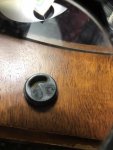Lugbolt, there's a couple things you may have inadvertently overlooked.
Methanol...and Ethanol... are not the same thing. They are both alcohols but Methanol is used to enhance fuel performance (sometimes with methanol/water injection) and the systems designed to use Methanol are made of materials which are Methanol-tolerant.
Ethanol is what is found in auto fuel at gasoline stations and IS CORROSIVE to systems that are not specifically designed for it... and for systems which are cheap Chinese designs such as inexpensive carburetors with steel float-bowls.
You are correct that fuel should be used while fresh and machines should not be stored with ethanol-based gasoline. Run the machine out of fuel (turn the fuel valve off) and drain the carb bowls (most have a 10mm bolt on the bottom of the bowl) ***8230; and use the appropriate Stabil product in all fuels kept over 60 days.
One of the "things left behind" is water... which IS corrosive. Alcohols... ALL alcohols are hydroscopic. They attract and retain water. When the fuel/alcohol evaporates...the water corrodes the steel parts in the system. (And alcohols, even those in alcohol-tolerant designs, will wash-away lubricants* and corrosion-preventives...and THEN the corrosion begins.)
*Yes, fuels contain additives including lubricating and corrosion-preventive additives. Alcohol will dissolve and remove those if left in-situ.
I am fully aware of methanol and it's differences between it and Ethanol.
if you had 100% ethanol, you could drink it and the worst that happens is you get drunk..... (yeah same stuff, ethyl alcohol). Try it with Methanol and you'll go blind, if enough, croak off. The names are similar however the chemical properties are way different.
"Everybody" said Methanol is as corrosive as acid. It may be, but it's not nearly as bad as "everyone" says it is. I've personally run every single piece of gas burning equipment I own on Methanol, it sits for months/years and never needs anything. Maybe I'm on borrowed time. Or maybe not. yes that includes the mowers, weed-eater, 4 wheeler, bikes, even the little 2 stroke scooter. Open up the jets, play with needles and float level, etc, they run fine. I run it 100%, no mixing with anything (aside from an occasional mix with CH3NO2). It in itself is a great fuel, however, with stoich being near 6.5:1, you need roughly twice as much of it. Thus, it'll never catch on for a motor vehicle fuel. Not to mention the fumes and it's inherent dangers (burns with VERY light colored flame which is not seen in the daytime...so you only know it's on fire if it's burning something else with it, OR, you "see the heat"-or worse yet, get burned severely because you can't see the fire.
What Ethanol does is attract moisture; and this happens over a long period of time (months). In that same time frame, the fuel evaporates; and what's left is corrosive, it won't burn right, the moisture that's left in it is a breeding ground for microbes, etc. That's my theory based on what I've been seeing with different pieces of equipment. Ethanol in itself isn't as corrosive as people blame it; if it was, it wouldn't be allowed in motor vehicles because of safety hazards of it eating steel gas tanks, eating piston tops, aluminum fuel rails, cylinder heads, injectors, fuel pressure regulators, fuel pump and pump parts, fuel filters, etc. If it were "that" corrosive, we would be seeing manufacturers making parts out of different metals that aren't attacked by it. Titanium? The cost of already expensive cars would be....well more expensive.
I'd try some equipment on 100% Ethanol if I could get it, but that's impossible to find because it's what beer and other alcoholic drinks are made out of. If it were available as 100%, every drunk would be buying it by the barrel; so the best you can do it 98% and even that is extremely hard to find. Indycar (since the Indy 500 is coming up) run their stuff on E98. Gasoline alley sorta smells like a bar if anyone spills any (and they do).


